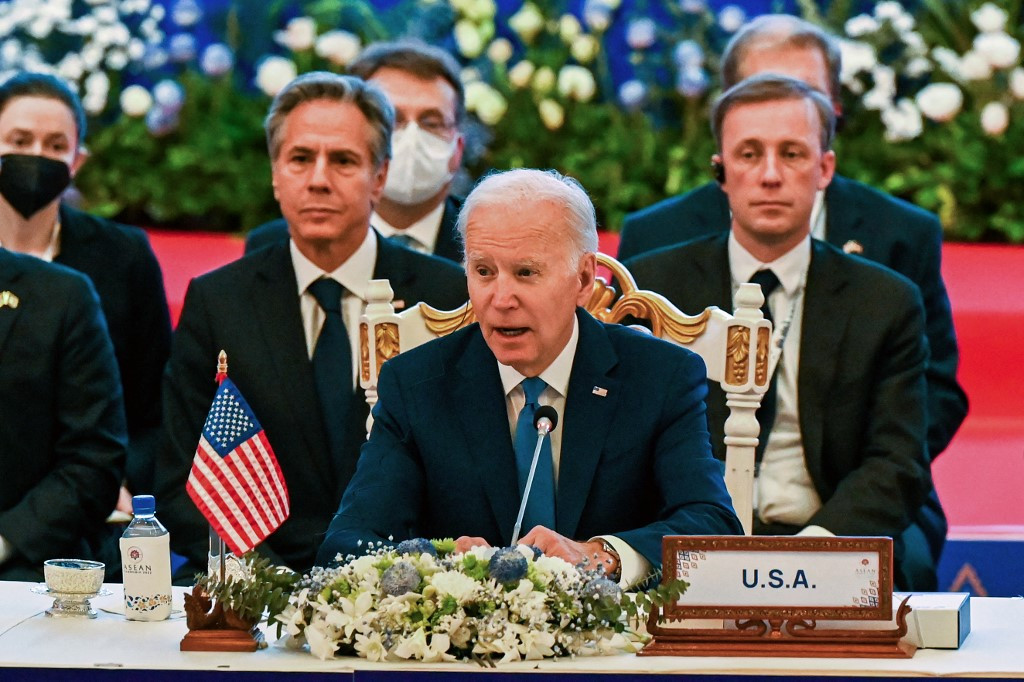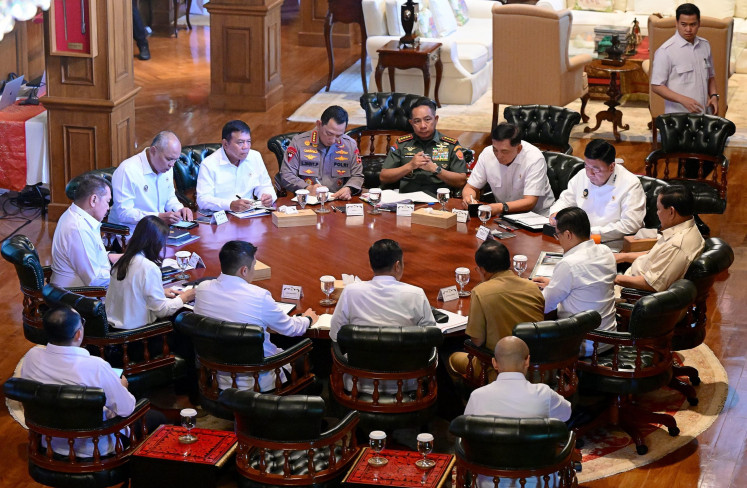Popular Reads
Top Results
Can't find what you're looking for?
View all search resultsPopular Reads
Top Results
Can't find what you're looking for?
View all search resultsBiden says won't veer into conflict with China
Addressing the East Asia Summit in Cambodia, Biden said the United States would compete with China and speak out over its human rights record, but stressed the importance of peace in the Taiwan Strait and ensuring freedom of navigation in the South China Sea.
Change text size
Gift Premium Articles
to Anyone
U
S President Joe Biden told Asian leaders on Sunday that US lines of communication with China would stay open to prevent conflict, as the first of three summits of world leaders this week came to a close.
Addressing the East Asia Summit in Cambodia, Biden said the United States would compete with China and speak out over its human rights record, but stressed the importance of peace in the Taiwan Strait and ensuring freedom of navigation in the South China Sea.
Biden also condemned Russia's "brutal and unjust" invasion of Ukraine and the threats of North Korea's missile tests, the White House said, and called on Myanmar's military rulers to follow a peace plan they agreed to with the Association of Southeast Asian Nations (ASEAN).
On China, Biden told the summit that "the United States will compete vigorously.... while keeping lines of communication open and ensuring competition does not veer into conflict," the White House said in a statement.
The Southeast Asia region is also hosting the Group of 20 (G20) Summit in Bali this week, ahead of which Biden will meet Chinese counterpart Xi Jinping for the first time since taking office, with relations between the two superpowers at their worst in decades.
The war in Ukraine is expected to figure prominently in discussions in Bali and at the Asia-Pacific Economic Cooperation (APEC) forum in Bangkok at the end of the week, as well as global climate commitments, food security and tensions over the Taiwan Strait, the South China Sea and North Korean missile launches.
Eighteen countries accounting for half the global economy attended Sunday's East Asia Summit, including the ASEAN nations, Japan, South Korea, China, India, the United States, Russia, Australia and New Zealand.
Russian Foreign Minister Sergei Lavrov is representing President Vladimir Putin at the summits and on Sunday accused the West of militarising Southeast Asia to contain Chinese and Russian interest in a key geostrategic battleground.
"The United States and its NATO allies are trying to master this space," Lavrov told a news conference in Phnom Penh, quoted by AFP.
Lavrov was speaking to reporters at Phnom Penh's airport after attending the East Asia Summit in Cambodia -- and before flying to Bali for the G20 summit where Xi and Biden will meet.
Earlier on Sunday, Biden said he would establish "red lines" with Xi.
Washington is attempting to boost its influence in Southeast Asia, worried by Beijing's increasingly assertive behaviour in the region, which it views as its strategic backyard.
Lavrov accused the United States of pushing the "militarisation of this region, clearly aimed at containing China and limiting Russian interests in the region".
As the Ukraine invasion has ground on, and with Western sanctions biting, Russia has pivoted toward Southeast Asia in an attempt to shore up its battered economy.
Lavrov called Washington's strategy -- which has seen the United States push for closer relations with Southeast Asian nations -- "not inclusive and that compete with the inclusive structures created around ASEAN".
The regional summit in Cambodia has been dominated by international concerns, as first Ukraine and then the US-China rivalry overshadowed local concerns such as Myanmar.
At a separate news conference, Australian Prime Minister Anthony Albanese said his brief discussions the previous day with Chinese Premier Li Keqiang were constructive and positive, amid anticipation of a formal summit with Xi.
Like ally the United States, Australia's ties with China have also deteriorated in recent years.
"I have said repeatedly about the relationship with China that we should cooperate where we can," Albanese said. "And that dialogue is always a good thing."










